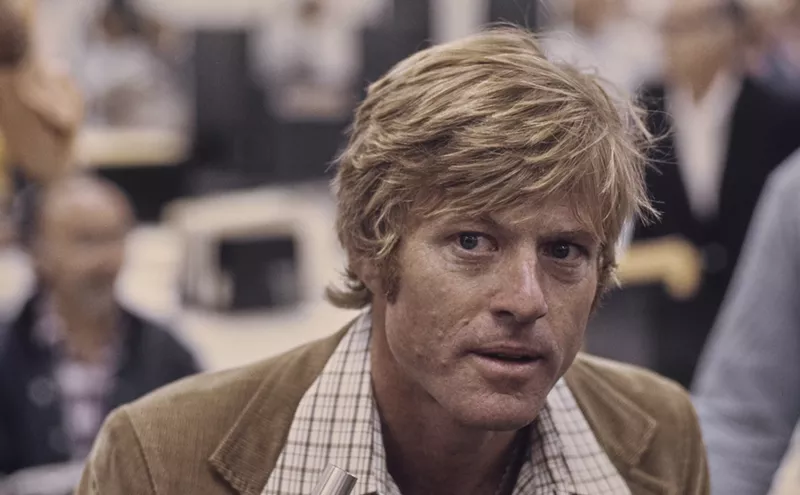The poetry in Shepard's enormous canon (45 plays, among which are 11 Obie winners) has hoodwinked more than a few actors and directors into taking Shepard, as crazy as it sounds, too seriously. The power of the man's writing lies in the sincerity and enthusiasm with which his performers enunciate their characters from a comic perspective.
Stepping outside the theater and into the moviehouse, we need only watch the disastrous 1994 film version of one of Shepard's most searing scripts, the absurdist white trash sculpture Curse of the Starving Class. How could a movie starring Kathy Bates, James Woods, and Randy Quaid manage to avoid a single stirring moment? You've gotta work pretty hard to squash that much talent, and the filmmaker nearly broke his back encouraging these marvelous character actors to inject their performances with a semi-mystical ponderousness. Here's the trick: A brother pissing all over his sister's school project isn't the act of a noble savage, it's a snapshot of trailer-trash adolescence that ought to be imbued with the appropriate sense of laissez faire lunacy.
An earnest, able company can futz up the recipe, too--Kitchen Dog Theatre's recent staging of True West proved that. I hate to kick the Dog in a review of Stage West's North Texas premiere Simpatico, the playwright's 1994 effort. But having thoroughly enjoyed the maliciously spry Fort Worth staging of Shepard's showdown between doublecrossing racetrack crooks, I suddenly realized what had gone wrong with the Dallas production of True West.
Dan Day and Joe Nemmers, two actors who've exhibited a strong comic sensibility in past shows, played the not-dissimilar showdown between the screenwriting brothers Austin and Lee as a powerhouse drama with breaks for some tension-relieving laughter. They might passionately argue with me that this was a legitimate way to treat the comedy in a Shepard play, but my point is that comedy in this man's work doesn't serve a particular purpose, it is the purpose. Even his bitterly remorseful Pulitzer Prize winner Buried Child rotated on the axis of a powerful absurdity--a family that's convinced itself an estranged son is dead and buried, even in his presence--that might easily have spun the wheels of a Beckett play.
If Joe and Dan had aimed their sights a little lower, their performances would've truly benefited from the enthusiasm and ability they poured into the roles. As it was, they wound up emoting into a wind tunnel--their words were loud and passionate, but their meaning wasn't especially discernible. Shepard should be savored like a dirty joke, one of those shockingly clever ones that reminds you how the mind and the body are quite separate but hopelessly intertwined entities. Then his poetic monologues, aphorisms, one-liners, and soliloquies acquire the beautiful red of authentic yearning.
Be crude, yes, but beware the swamp of Scorcesian camp, as Stage West has in this saga of the imploding friendship between deranged petty con man Vinnie (John Puddington) and the man he does "favors" for, family man and blackmailer-money launderer-extortionist Carter (Jim Covault). Vinnie has enough dirt on Carter to plant a cornfield, so he can get the man to jump on a plane and fly to his California roach nest for a reason as flimsy as trying to encourage a grocery store cashier named Cecilia (the delightful Laurie McNair) that she should return to him. Or was that why he wanted Carter? As Carter attempts to persuade Cecilia, Vinnie rekindles old enmity by returning to the man he helped blackmail, a ruined former horseracing commissioner named Aims/Simms (Jerry Russell).
Simpatico has been compared to a film noir in tone, but the grittiness from this production feels more like a crime novel. If Dick Francis and Jim Thompson could combine their genes, implant them in Patricia Highsmith's body, and produce a "gayby," he would write with the necessary verbal craftsmanship and gutter verve to turn Simpatico into one hell of a vacation read. The characters wiggle their tails with a total obliviousness to their own sordid lives, which is a good way to describe the last-flophouse-on-the-left burlesque of Simpatico.
Director Covault also happens to play the crumbling stoic Carter, and that may have a lot to do with the palpable connections the actors make onstage. It's a rare case of the coach and father confessor joining the sport for the sinful pleasure of it. He provides a fascinating counterpoint to the unpredictable Vinnie, who isn't a loose cannon, but a Saturday Night Special with a hairtrigger. He's dangerous nonetheless, and John Puddington nicely balances the sniveling quality of the character's hopes--for a woman who will love him, a stable future, the next drunk--with a real respect for their sincerity. In this way, he shares a link with Carter--they've been friends since the sixth grade. We can picture them on the playground together: doughy, impulsive Vinnie and wiry, cool-as-a-cucumber Clark attempting to get a girl to notice them. The woman they share, albeit at different times in their lives, is on some level a traded commodity between them. Although Rosie, played with expert fire by Kathleen Marie Archer, made up her mind to dump Vinnie for Carter.
Jim Covault contributes a lot to the intensity with which I became involved in Simpatico for another, perhaps inadvertent reason: I spent the first act alternately digging and disdaining his acting style. Actors, like most other artists, usually hate the word "style," because it's a label imposed from outside. But the interaction of hands, voice, eyes, mouth, and temperament combine so uniquely in some actors that we're forced to contemplate the nature of acting itself. Their style makes us decide what we want from a performance--authenticity or expression. They are not always companions.
In the end, if an actor has articulated the playwright's vision effectively, he will be excused for all manner of eccentricities. Covault wasn't totally mannered, but there were elements of affectation, especially in his moments of anger. This often rises to the surface when an actor is defending himself against an emotion. He looks like a taller, skinnier Donald Pleasance, and talks with nasal jabs of his droll voice. And yet, by the play's climax, he had underplayed a showboat role and convinced me that the hypocritical Carter was a truer scumbag than Vinnie, because Carter refused to recognize his own cruel streak. Simpatico feeds hungrily on the wild oats sewn by disreputable men, fueling up to trot around the stage and display its mangy hide with a regal bearing.
Simpatico runs through April 26. Call (817)












